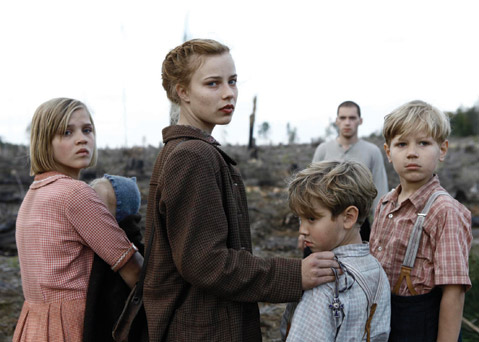Lore
Saskia Rosendahl and Kai Malina star in a film written by Robin Mukherjee and Cate Shortland, based on the book The Dark Room by Rachel Seiffert, and directed by Shortland.

On the general landscape — and/or minefield — of the war film genre, one of the rarely trodden subgenres relates to the fragile, transitional turf of war’s end and peacetime’s beginning. It’s surprising, actually, as that shifting moment and repolarized setting can be rife with dramatic intensity as the chaos and moral tailspin of wartime wends its dizzy way back to some semblance of normalcy. By some odd coincidence, two such films are hitting theaters just now. Both the Hollywood film Emperor and the stunning and chilling Australian/German film Lore dissect the finale of WWII, but from different angles and with different degrees. Emperor deals with the American transition effort in Tokyo and is peopled with top-level historical figures — including MacArthur and Hirohito; Lore is more literally a tale told at ground level, with suddenly displaced German children sent into the perilous land of post-Hitler Germany.
What makes Lore such a special and also uniquely troubling filmic experience is its effective empathy with young characters whose innocence is tested in harsh ways. If end-of-war cinema is a thinly populated niche, films that get inside the heads of children are another rarity. Insight into a young mind that is working through propaganda imposed at the parental and social level to starker truths in the world is almost the truer meat and message of the film.
Our heroine, Lore (Saskia Rosendahl), is a young teenager abruptly appointed head of the headless family’s brood of children. They slink and meander their way to Hamburg and some semblance of safety, shepherded in part by a protective young man with Jewish identity papers (now a valuable document). It is a testament to the focused expressive power of the film, as well as the remarkable subtlety of Rosendahl, that we are so drawn into her rapidly readjusting take on life as she comes to terms with the anti-Semitism drilled into her while facing a radically altered hinterland.
But this is not History Channel fare. Director/cowriter Cate Shortland artfully leaves out more details than she fills in — akin to the child’s-eye mind state — and injects her own spin on the juxtaposition of nature’s beauty and man’s morass. As we find out, war has a way of bringing that duality into sharp, painful focus.



